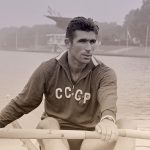The Greatest Sculler? Sculler or Slugger?
Jim Joy recently posed the following question: “We do not have a good sense of history in rowing/sculling. I always thought that Boxing had a better sense. Sugar Ray was a terrific technician and athlete/dancer. What we are looking for in sculling?”
My reply is below.
Equipoise… an equal balance of powers.
The root of the word is reminiscent of equine, but it’s just similar to “equal.” I often use equine analogies in coaching. There are similarities to horseback riding and horse racing, particularly trotters and pacers, where technique is essential and equal to power and quickness… if you break stride you lose, not dissimilar to our sport. There must be a balance of power and technique that results in maximum speed.
Rhythm and dancing are also fine analogies, I use them often coaching scullers and sweepers, but the goal in dancing is not to go faster but to go more beautifully. The analogy ends there.
There is a lore, and there is a history of sculling/rowing. Before 1960 or so, the most prominent sports in the country were (in no particular order) boxing, horse racing, college football, baseball, with collegiate and Olympic crew racing right up there with them. The worm turned of course in the postwar era with the rise of professional football and basketball, as horse racing, crew racing, and, to an extent, boxing, became anachronistic “niche” sports.”
How did the sportswriters in the 1930’s, 40’s and 50’s write about rowing? They wrote a great deal about it of course, and much of it was very evocative and even poetic. These sorts of depictions of rowing rarely occur any more. Books like Seabiscuit and The Boys in the Boat harken back to the talented and inspired sportswriter of the bygone era, as of course they are retelling the stories of the sportswriters, but they really are one-offs.
The papers just don’t really cover rowing any more. Before too long newspapers will not be made of paper. The days of the sports editor of the Seattle Times hanging out at the shell house every afternoon are long gone. There are no dedicated rowing writers who know the sport, love it, and write about it with passion and precision. Without the writers, there is no writing, and so the record and the history fade. Boxing is still barely hanging on in the hallways of the New York Times, as evinced in the article about Jake LaMotta, but for how long?
How time flies, like scullers on the Thames.

















